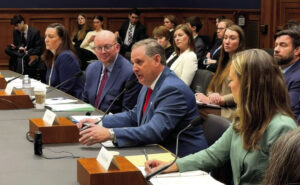From the State House
By Staff
Steve Flowers
For several years there has been an outcry to pass legislation to stop PAC to PAC transfers.
This is something that should be addressed because this deceptive practice has rendered Alabama's campaign finance laws useless. We may as well do away with the law that requires PACs and candidates to report contributions if we do not close this glaring loophole.
The practice of a special interest or individual giving money to a PAC that is going to another PAC, which gives to another PAC with the knowledge and intent to disguise the candidate they gave their money to is outright fraud and is simply money laundering.
This practice has become rampant in recent years. There is no way to discern who is giving to whom. The paper trail is so pervasive and creative that you, the voter, will never know the source of a candidate's financing.
Governor Riley should attack this one issue head on. He should heed the KISS formula and not offer a laundry list of two dozen "accountability bills."
If Riley focused on a single issue at a time, he might get a heads up vote on this issue.
Campaign finance laws and ethics disclosure forms for political campaigns and officeholders were enacted throughout the country in the 1970's. These reforms were adopted in most states in reaction to the public outcry for ethics reform after the Watergate corruption. Practically every state passed an ethics law.
There was even a model ethics law that was used as a framework from which states could create their own act, along with campaign finance disclosure laws. This model act was a very tough law, so in most cases the state legislatures chose to deviate from this strict model when drafting their own ethics laws.
In the 1970's, Alabama had a lot of veteran and crafty and crusty legislators who simply ignored the national trend and had no intentions of passing an ethics law. That did not keep the Alabama media from constantly harping on the need for such legislation. The press would hammer home the need for ethics in the legislature daily from the front pages to the editorials.
George Wallace was Governor and he had pretty much dismissed ethics reform as an issue. He did not want to put his friends in the legislature on the spot. He had a very harmonious working relationship with the legislature and did not want to step on their toes and create a hornet's nest.
However, lo and behold one day late in the legislative session Wallace decided to get a little good press. He called his legislative leadership team in and said there are only a few more legislative days left in the session and it's too late for anything to pass, much less an ethics bill, so let's appease the press and throw them a bone by introducing the bill.
They not only put in a bill, they used the toughest model act in the country. The bill was introduced in both chambers with an agreement that each body would kill the others bill. The House would pass the House Bill and all the representatives would get credit for voting for an ethics law, knowing full well that the Senate would kill it.
The Senators would then do the same so they could get credit knowing the House would kill their bill. They went about with their plan and gleefully passed the strongest ethics law in the country. Both they and Wallace enjoyed their day in the sun for being tough on ethics reform, although hardly any of the Senators or House members were for the package.
The press put a spotlight on the measures like they never had before and focused on the need for final passage. Things got out of hand and the House succumbed to public opinion and the bill got to the floor of the House. In a game of Russian roulette the House chickened out. Once it got to a vote, the representatives were hard pressed to vote against it. What began as a charade by Wallace ended up with Alabama having one of the toughest ethics laws in America.
Only a handful of House members had the nerve to vote against it. One was the crustiest and craftiest in the history of the legislature.
Rankin Fite, the legendary House Speaker from Hamilton, who had done pretty well for himself and his county before any ethics law, voted against it. The press congregated around old Rankin's desk and asked why he voted against it. He looked them squarely in the eye and said it wasn't tough enough.
See you next week.
Steve Flowers is Alabama's leading political columnist. His column appears weekly in 70 Alabama newspapers. Steve served 16 years in the State Legislature. He may be contacted at www.steveflowers.us.







